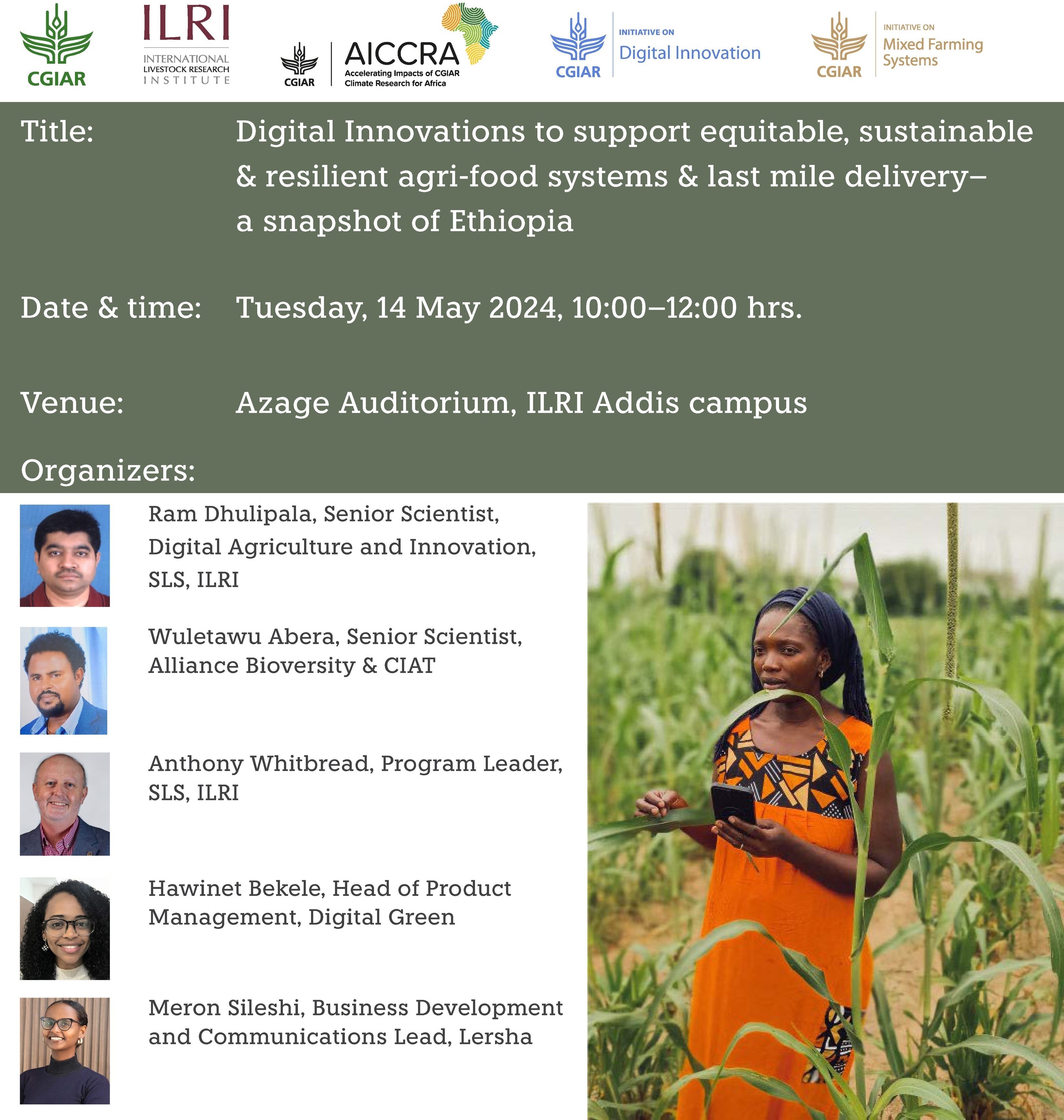

Digital solutions for a sustainable future: Key takeaways from a convening of digital agriculture experts working in Ethiopia
On 14 May 2024, stakeholders from Ethiopia explored the transformative impact of digital innovations on agri-food systems. Hosted by the International Livestock Research Institute (ILRI), the workshop they attended—Digital Innovations to Support Equitable, Sustainable, and Resilient Agri-Food Systems and Last Mile Delivery – a Snapshot of Ethiopia—explored how innovative technologies are reshaping the agricultural landscape while fostering equity, sustainability and resilience.
Led by experts from ILRI, the Alliance of Bioversity and CIAT, Digital Green and Lersha, the webinar's 27 participants delved into a range of solutions that are empowering Ethiopian farmers and agricultural value chain actors. Discussions covered important topics like business models of digital agriculture, the challenges of integrating innovative technologies with existing practices, and the importance of building trust between farmers and digital service providers.
 Anthony Whitbread, program leader of the Sustainable Livestock Systems Program at ILRI, set the stage by introducing the key role of digital technology in addressing global food system challenges. He emphasized the need for digital innovations to link farmers and pastoralists with input-output markets, extension, climate services, particularly in Ethiopia.
Anthony Whitbread, program leader of the Sustainable Livestock Systems Program at ILRI, set the stage by introducing the key role of digital technology in addressing global food system challenges. He emphasized the need for digital innovations to link farmers and pastoralists with input-output markets, extension, climate services, particularly in Ethiopia.
The workshop showcased a range of initiatives. The CGIAR’s Digital Innovation Initiative (DII), for example, is collaborating with Scotland's Rural College (SRUC) and a Korean startup called BoDit to develop a digital twin for the ILRI Kapiti Research Station and Wildlife Conservancy. Another example was the digital platforms developed under the World Bank’s Accelerating Impacts of CGIAR Climate Research for Africa (AICCRA) project called AgData Hubs (agricultural data hubs). Developed in collaboration with national meteorological organizations and agriculture institutions, these hubs integrate climate and agricultural data for climate informed agroadvisories. They pave the way for public and private sector actors to develop more relevant and actionable weather advisories, empowering farmers with the information they need to make informed decisions and adapt to changing conditions.
As Ram Dhulipala, senior scientist at ILRI, highlighted, The agricultural data hubs are designed to be hosted and managed by national agencies, enabling web-based access to localized climate, weather, soils and agriculture datasets.'
Wuletaw Abera of the Alliance of Bioversity and CIAT presented a promising initiative, the NextGen Agro-advisory System, which offers location-specific fertilizer recommendations to farmers through a web platform and various digital channels. This system has reached over 10,000 farmers, with some users experiencing a remarkable 38% increase in grain wheat yield.
Wuletaw emphasized the potential of such data-driven tools: ‘Empowering farmers with location-specific data and digital tools has the potential to revolutionize Ethiopian agriculture.’
Digital Green utilizes video-based extension services, farmer profiles and AI-powered advisory bots. This innovative combination allows for localized and customized advice, ensuring farmers receive the guidance that best suits their specific needs and circumstances.
Hawinet Bekele, head of product management at Digital Green, emphasized the program's success: ‘Over 40 per cent of farmers adopting at least one new practice is a testament to the effectiveness of our video-based extension program.’
Lersha offers a comprehensive solution that includes digital climate advisory services and connections to essential inputs and mechanization, financing options and market linkages. This holistic approach empowers farmers in terms of knowledge and their ability to access resources and secure better market opportunities.
Meron Sileshi, Lersha's communications and business development lead, shared that the firm strives to 'make agriculture easy for everyone by harnessing digital solutions to increase farmer income, enhance food security and build agricultural resilience'.
The workshop discussions allowed dialogue addressing the challenges that need to be tackled for the wider adoption of digital agriculture. Access to finance and invest in innovative technologies emerged as a significant barrier. Developing sustainable business models for digital solutions and a clear understanding of the benefits were highlighted as crucial factors in encouraging wider adoption of these tools. Ensuring that the information provided is timely and relevant is also essential. The discussion emphasized the need for technologies to integrate seamlessly with existing solutions, avoiding additional complexities for farmers.
Looking ahead, the priorities for advancing digital agriculture in Ethiopia are clear. Building infrastructure and ensuring that farmers have equitable access to digital services is paramount. Developing mechanisms to effectively analyse and utilize agricultural data will provide valuable insights for further development. Additionally, creating an enabling policy and governance environment will foster innovation and create a supportive ecosystem for digital agriculture to flourish.
The workshop was co-funded by the CGIAR Initiatives on Digital Innovation and Transformation and Mixed Farming Systems.
Read the workshop report.




